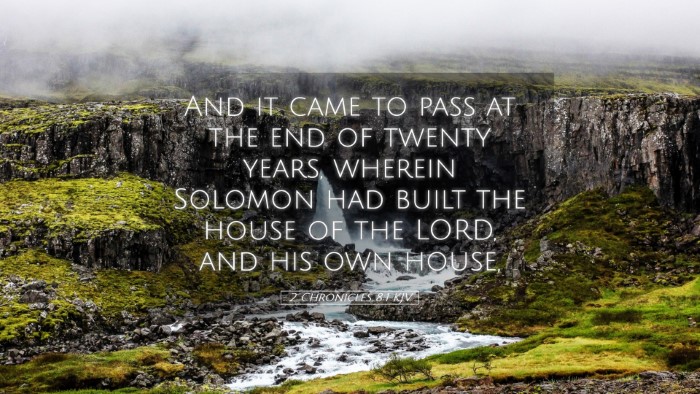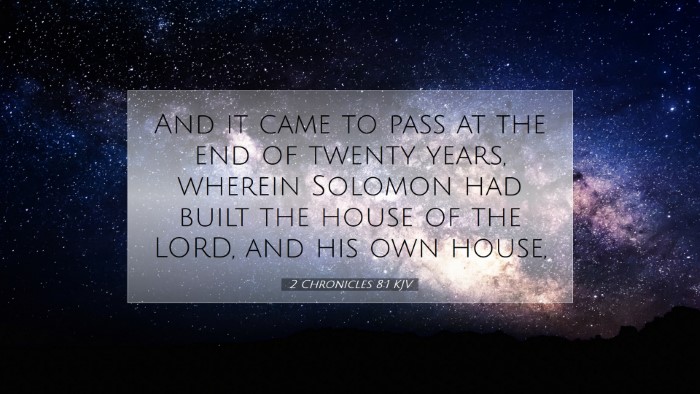Commentary on 2 Chronicles 8:1
Verse Reference: 2 Chronicles 8:1
This verse states: "And it came to pass at the end of twenty years, wherein Solomon had built the house of the Lord, and his own house," This passage marks a significant point in Solomon's reign and the overall narrative of Israel's history.
Introduction
This commentary combines insights from various public domain sources such as Matthew Henry, Albert Barnes, and Adam Clarke. It seeks to explore not only the historical context of the verse but also its theological implications, enriching the understanding for pastors, students, theologians, and Bible scholars.
Historical Context
At the time of this passage, Solomon has been reigning for twenty years, during which he has accomplished the monumental task of building the Temple of the Lord. This was a fulfillment of David's desire, as indicated in previous chapters. This verse helps us understand the chronological aspect of Solomon's reign and the significant undertakings during that period.
- Construction of the Temple: Solomon's construction of the temple is more than just a physical structure; it is a relational restoration between God and His people.
- Solomon's House: The dual construction projects highlight the nation's prosperity and the establishment of Jerusalem as the political and spiritual center of Israel.
Theological Implications
This verse has several theological dimensions that speak volumes to the character of God and His covenant with Israel:
- Covenant Faithfulness: God's faithfulness is evident as He fulfills His promises to David by allowing Solomon to build the temple.
- Divine Wisdom: Solomon’s ability to build the temple stems from the wisdom granted him by God, showcasing the importance of divine wisdom in leadership.
Prosperity and Peace
In examining the peace experienced in Solomon's reign, we note that this time of construction coincides with a period of stability and prosperity for Israel:
- 20 Years of Peace: Solomon’s reign had been characterized by peace, which allowed him the resources and time necessary to focus on these monumental building projects.
- Worship Centralization: The building of the temple was a centralizing act for Israel's worship, which would shape the nation's spiritual identity for generations.
Reflections from Commentaries
Matthew Henry remarks on the significance of the timing indicated in this verse. He emphasizes the importance of laboring on the Lord’s house first, which symbolizes prioritizing one's relationship with God before personal pursuits. This insight serves as a vital exhortation for contemporary believers in their Christian walk.
Albert Barnes contributes to the discussion by indicating that this passage marks a turning point in Solomon’s reign, as considerable resources had been devoted to the construction of the temple. Barnes notes that the investment of time and resources into God’s house reflects a profound relationship between the Israelite society and their creator.
Adam Clarke highlights the dual fulfillment of God’s covenant—both in the establishment of the temple and in the security of the nation under Solomon. He insists that the physical structure signified a deeper spiritual reality, one that was to be reflective of the nation’s allegiance to God.
Applications for Today
The insights gained from this commentary have several applications for today's believers and leaders:
- Prioritize God in Leadership: Leaders in the church and community must prioritize their relationship with God, as Solomon did in building the temple.
- Use Resources Wisely: Spirituality should guide the handling of resources, both material and spiritual, mirroring Solomon's commitment to constructing a suitable place of worship.
- Encourage Community Worship: Churches today can learn from Solomon’s focus on centralizing worship, encouraging a communal approach to faith that fosters unity and spiritual growth.
Conclusion
2 Chronicles 8:1 serves as a pivotal verse that encapsulates the high points of Solomon's reign, illustrating the connection between leadership, covenant faithfulness, and the importance of dedicating one's life to the service of God. The reflections provided by the classical commentaries challenge and inspire modern readers to consider their role in continuing to build the 'house of the Lord' in both physical and spiritual realms, enriching their communities and establishing a legacy of faithfulness.


